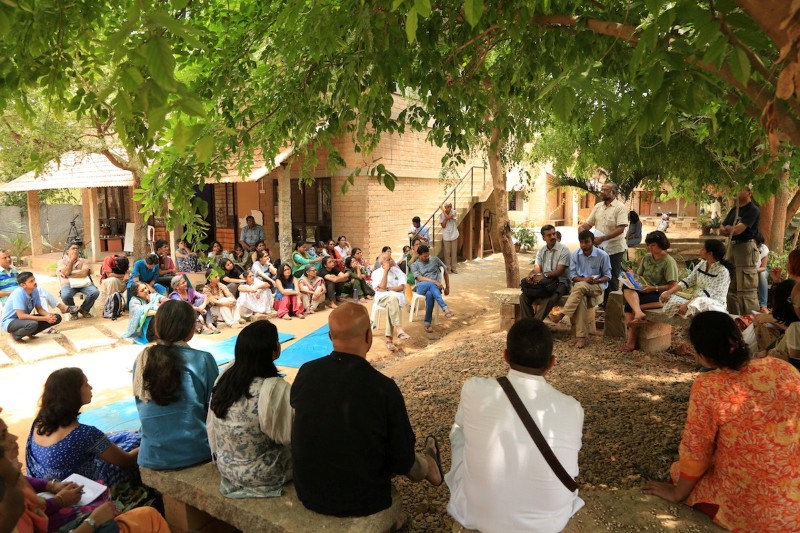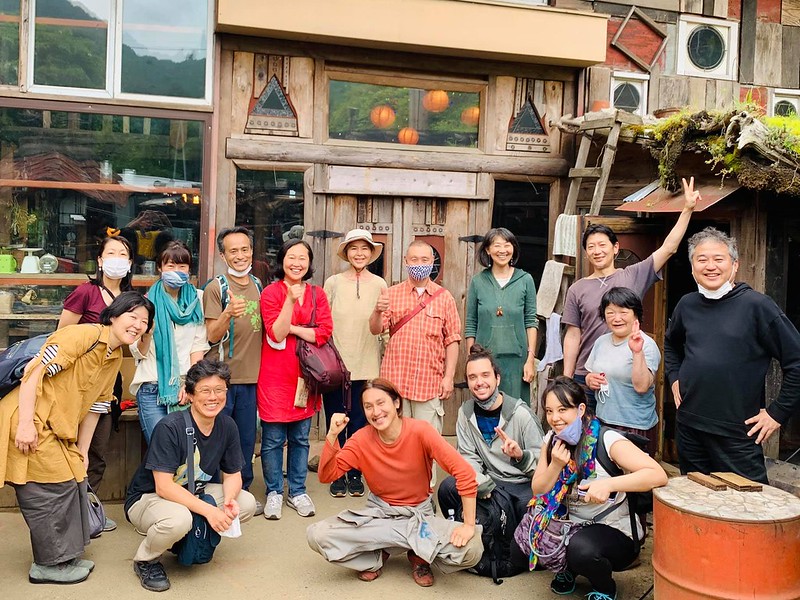Meet the active networks working from the bottom up
It’s too easy to get depressed by the daily news cycle of wars and the threat of A.I., and to assume that nothing at all is going on to take the world in a more life-affirming direction. The truth is, there are thousands of grassroots projects on every continent challenging the bigger-is-better, high-tech trajectory of the global economy, and reweaving just and sustainable local economies instead.
Localisation is an economic strategy for rapid transition that could transform farming, business, finance, health, education, and industry for the better. Our first blog in this 2-part series explored bottom-up examples in the food sector – from Australia, India and Vietnam – to illustrate the ‘solution-multiplier’ effect of shortening the distances between producer and consumer. We saw how localisation slashes resource consumption and emissions, while boosting biodiversity, food security, agricultural productivity, jobs, and community connections.
But for localisation to really take off, we need ‘top-down’ policy-based support as well. Currently, economic subsidies and regulations favour large-scale producers, and governments continue to invest in the technology and infrastructure for global trade, while leaving small businesses, local markets and town centres to crumble.
A strategic restructuring of economic supports could take the wind out of the colonising sails of multinational corporations, and breathe life back into the smaller-scale economies and cultures that are rooted in – and accountable to – communities, ecologies, and democracies.
With grassroots initiatives often overlooked by the mainstream media and government alike, my hopes for the future are pinned on the activist networks working to connect localisers to one another. These are the networks advancing a political voice that can call for policy changes. They are also contributing to a seismic shift in the mainstream worldview – away from valuing consumerism and “bigger is better”, towards an embrace of community, nature, slower-paced living, and local economies.
Who are these networks? And what is their strategy for rapid transition? Here are just a few of them who featured in June 2023’s World Localization Day campaign:

- Bhoomi Network, India:
Just outside of the South Indian city of Bangalore – a city known as the high-tech capital of India – a remarkable institution called Bhoomi College is a living nucleus of localisation. On its lush campus of hand-built mud buildings and abundant food gardens, Bhoomi hosts farmers’ markets, repair cafes and conferences. It is a hub for a new generation of young people from all over India who are questioning conventional education, urbanisation, and consumerism, and envisioning more just and sustainable futures. They are guided by visiting activists and practitioners of all kinds – in local food and farming, crafts and handlooms, holistic education, independent journalism, green energy, wiser trade policy, sustainable water systems, and more.
The students, in turn, often go on to trailblaze their own paths, and Bhoomi College is now the centre of the India-wide Bhoomi Network of alternative schools, agroforestry conservation projects, ecovillages, local food networks, and local businesses of all kinds. In the words of Bhoomi’s founder, Seetha Ananthasivan, “what gives us hope are the millions of deep thinkers and their initiatives that promote localisation as a major systemic solution.”
- Localisation networks in Japan
Japan was once a country that fed millions of people almost entirely within its own borders. Today, thanks to globalising pressures from multinational corporations, Japan is at its lowest level of food self-sufficiency ever, and has more McDonalds than any country, barring the US and China.
However, particularly since covid, there has been an explosion of awareness about the need for organic local food for people’s health, and for food security. Mika Tsutsumi, an investigative journalist and bestselling author, has been sounding the alarm about the corporatisation of Japan’s food systems, and calling for policies to support localisation. She is a leading voice for hundreds of thousands of concerned mothers in Japan, who want organic school lunches for their children’s health. In the autumn of 2022, 40,000 Japanese people gathered in a forum pressuring for organic school lunches.

Keibo Oiwa from Meiji Gakuin University reports on the growing movement: “We see a lot of grassroots movements throughout Japan focusing on food. And I believe localisation has to start from food issues.”
Keibo has witnessed a plethora of inspiring initiatives – like ecovillages, community cafes, alternative schools and organic regenerative farming models – gaining ground in his country. Convinced that these initiatives need to connect if they are to be strong, he has helped establish The Sloth Club, the Economics of Happiness forum, and the World Localization Day Japan Committee, which spread awareness about localisation and slow-living throughout Japan and strengthen connections between grassroots initiatives.
- Brazil – agroforestry, community, and local clothing
In Brazil, regeneration and agroforesty are being supported by the system of carbon credits. However, this system is centralised and corporate-owned, and can end up further eroding the self-sufficiency of communities and indigenous peoples.
Thais Mantovani, from EcoUniversidade in São Paulo, sees the need to adapt the concept of ecological regeneration to place, making it bottom-up, instead of top-down. In a recent webinar coordinated by Local Futures, Thais described her efforts as an attempt to answer the question: “how can we localise regeneration in Brazil?”
Like the Economics of Happiness forum in Japan and the Bhoomi Network in India, EcoUniversidade is working interregionally to build collaboration between an array of grassroots localisation projects. The network includes urban farms in favelas, community-led cotton-growing, weaving and clothing design projects in Brazil’s north, and a widespread network of agroecology projects and community-supported agriculture schemes.
Localizing, Globally
Turning toward the worldwide localisation movement is the best antidote I have personally found to counter the sense of paralysis that comes from the persistent doom and gloom of current affairs. Paradoxically, perhaps, we need to grow our awareness about what is happening in other parts of the world, and connect across borders, to strengthen the localisation movement everywhere.
I encourage readers to check out Local Futures’ event, the Planet Local Summit in Bristol, September 2023, where a number of the voices referenced in this article will be speaking.
